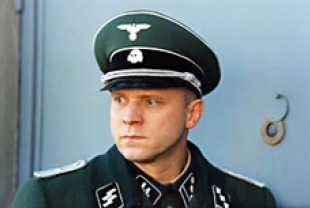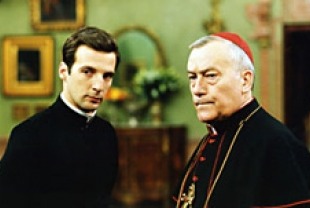In the opening scene of this morally-provocative drama, a young Jew, to protest the persecution of the Jews by the Nazis, shoots himself in front of a large group gathered at the League of Nations in 1936. His suicide has virtually no impact on those who witness it, proving how little interest the world had in the horrifying events that led up to World War II and continued through it.
SS Officer Kurt Gerstein (Ulrich Tukor) is a chemist who has impressed his superiors by developing Zyclon B gas pellets to be used to decontaminate water to prevent the spread of typhoid. Then he learns that his niece, a mentally challenged young woman, has been executed; a Christian minister explains that the Nazis have been systematically killing "undesirables." Some Protestant and Catholic clergy speak out from their pulpits against this policy of euthanasia.
Gerstein is taken by a powerful SS doctor (Ulrich Muhe) to Auschwitz, where he witnesses through a peephole how Zyclon B is being used to kill Jews. Shocked and engaged, this conscience-stricken Christian meets a Swedish diplomat on a crowded train and tries to convince him to tell the world through the Swedish embassy about this travesty. Meanwhile back home, his pro-Nazi father (Friedrich von Thun) cannot stomach his son's meetings with church officials. And his wife (Antje Schimdt) is distraught over his lack of time for the family. Despite Gerstein's eyewitness account of the gassing of men, women and children, his Christian friends cannot bring themselves to speak out against Hitler and his minions.
Gerstein barges in on the Papal Nuncio in Berlin with news of what is really going on in the so-called work camps, but his pleas to have Pope Pius XII, as the representative of Jesus, speak out against the atrocities fall on deaf ears. The Papal Nuncio says to his aide, "It's just a Gestapo provocation. Imagine an SS officer defending the Jews." But Riccardo Fontana (Mathieu Kassovitz), a Jesuit priest whose father is personally close to the Pope, is stunned by what he hears. This idealistic man realizes that he must convince the leader of the Catholic church to denounce these appalling crimes against humanity.
Director Costa-Gavras and Jean-Claude Grumberg have adapted Rolf Hochhuth's play The Deputy for the screen. At the heart of this drama are two idealistic Christians, one a Protestant and one a Catholic, who have a very clear vision of the right thing to do. They echo in their valiant deeds the zeal of Dietrich Bonhoeffer, the Lutheran minister who resisted the Nazis in Germany. "Do and dare what is right, not swayed by the whim of the moment," Bonhoeffer wrote. "Bravely take hold of the real, not dallying with what might be. Not in the flight of ideas but only in action is freedom."
The SS officer and the young priest are both saddened when a Christmas message by the Pope does not mention the Jews or the concentration camps. Putting his own life in jeopardy, Gerstein delays the shipments of gas and refuses to authorize the use of inferior gas. Meanwhile, Riccardo is taken aback to learn that Pope Pius XII (Marcel Iures) holds Hitler in "very low esteem" but sees Stalin, the embodiment of godless Communism, as the true threat to Christianity. When the Jesuit reveals that thousands of Jews are being murdered every day, the American ambassador tells him that winning the war against the Germans and the Japanese is more important than saving the Jews. In the end, both Gerstein and Riccardo make their private moral stands against the Nazis. Amen. pays homage to their courage and determination in the face of scorn and opposition on all sides.
Spiritually Literate Readings & Reapings of Amen.
• For his classes at the City College in New York, Elie Wiesel used to send his students to the index of the New York Times to see how the world responded to the situation of European Jews. "I asked them to check the years 1942 - 1943. Every massacre was reported in full detail. The press fulfilled its mission but the politicians didn't act. The Allies knew more than the victims." Amen. proves that the Jews were not only done in by the Nazis, they were victims of the indifference of the rest of the world. It also casts a shadow across the world today. Why do so many remain oblivious to the suffering and slaughter of those caught up in contemporary civil wars, ethnic cleansings, and racial conflagrations?
• Here are three quotations that are perfectly in sync with the moral messages of Costa-Gavras's film:
"Men are always accomplices to whatever leaves them indifferent." (George Steiner)
"The worst sin towards our fellow creatures is not to hate them, but to be indifferent to them; that's the essence of inhumanity." (George Bernard Shaw)
"The hottest places in hell are reserved for those who in time of great moral crises maintain their neutrality." (Dante Alighieri)
• Amen. confronts and accuses Christians of anti-Semitism. The silence of both Protestant and Catholic congregations in the face of Hitler's persecution of the Jews is well documented. This indifference to the plight of their neighbors was based on centuries of bigotry based on a warped view of the Jews as the killers of Christ.
• Amen. pays tribute to a righteous Gentile who in the face of death stands by his Jewish brothers and sisters. Theologian Dietrich Bonhoeffer criticized the German Evangelical Church for its identification with the Nazi movement and in 1940 stated that the church had "become guilty of the deaths of the weakest and most defenseless brothers of Jesus Christ." He also said: "Only he who cries out for the Jews has the right to sing Gregorian chants." For more statements, see Dietrich Bonhoeffer: Writings
• Amen. presents Pope Pius's commitment to a "diplomatic" model of the church in shaping his response to the Jews. Prudence, reserve, and patience were his watchwords, lest any nation be offended — even the Third Reich. Diplomacy, in the pope's view, was needed to preserve the church as an institution and insure the social order which he saw as necessary for the health of Catholicism. Critics of this policy, including Costa-Gavras, would say that institutional preservation should never take precedence over protection of the lives of innocents.
• In an interview in the International Herald Tribune, Costa-Gavras points out that he wants members of the audience who see this film to ask themselves: What would I have done in this situation? "For me, silence is the film's main theme. The silence of the people, the silence of a lot of people in the church. Some people dared to speak out, but the leaders of the church stayed silent. So it is all a metaphor for the silence."
Three other Costa-Gavras films focus on conscience and individual courage in the face of oppression: Z, Missing, and State of Siege.

